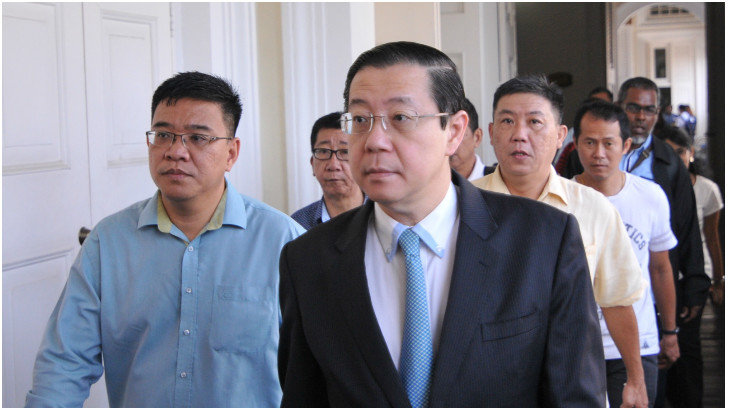GEORGE TOWN, Feb 7 — Defence lawyers for Penang Chief Minister Lim Guan Eng and his former landlord Phang Li Khoon challenged today a corruption law provision they claimed violates a basic tenet of law in which an accused person is presumed innocent until proven guilty.
Datuk V Sithambaran representing Phang and Gobind Singh Deo who acted for Lim told the High Court this morning that Section 62 of the Malaysian Anti-Corruption Commission Act (MACC) 2009 contravened Articles 5 (1) and 8 (1) of the Federal Constitution.
“The accused has the constitutional right of presumption of innocence and the right to remain silent, but this Section restricts the conduct of the defence even before the case is heard in court,” Sithambaran said in his opening argument.
He argued that the provision confines the accused person’s right to defend himself in court to a mere statement of defence, preventing the submission of additional documents that could support his case even if new evidence emerges during trial.
Section 62 of the MACC Act provides that the accused has to submit the statement of defence to the prosecution and be tendered as part of evidence for the defence.
The defence lawyers argued that it contravenes Article 5(1) of the Federal Constitution, which states that no person shall be deprived of his life or personal liberty save in accordance with the law.
They also contend that it contravenes Article 8(1) which states that everyone is equal before the law and entitled to equal protection of the law.
“The court has not called for defence and yet the prosecution is asking for the statement of defence, even before the court decides. This is against the presumption of innocence,” Sithambaran told the court.
Gobind told the court that Section 62 of the MACC Act effectively cripples an accused person’s defence as it only allows a very limited submission of evidence in the latter’s favour.
He also pointed out that Section 68 of the MACC Act made it an offence for those who do not comply with other provisions of the same Act, while Section 69 includes imprisonment as a penalty for offenders.
“This means we have to comply to Section 62 and if we don't comply, my client can be convicted and sent to jail for non-compliance,” Gobind said.
But Masry Mohd Daud who acted for the prosecution countered that Section 62 of the MACC Act was merely a procedure and a general provision that has nothing to do with Section 68 of the same Act.
“They don't have to submit a full defence. They can even submit a one-line defence and later submit additional defence during hearing and we will not take action,” the deputy public prosecutor said.
This led to a back-and-forth argument between the defence and prosecution, until High Court judge Datuk Hadhariah Syed Ismail stepped in by what happens if the defence does not comply with Section 62 of the MACC Act.
“We will then apply to the court to compel them to produce the statement of defence, no other action will be taken,” Masry said.
He maintained that Section 62 does not restrict the defence from submitting a statement of defence now and then presenting a different defence later.
But he was challenged again by Gobind who cited a Malacca case where the prosecution had argued that an accused didn't provide details of the defence that he had produced in court rendering it inadmissible in court.
Hadhariah then fixed March 7 for decision on the joint application by Sithambaran and Gobind.
Outside the courtroom later, Gobind explained that Section 62 is crucial to his client’s defence because the court must decide if a strict reading of the provision has a mandatory effect.
“If that's the case, its impact on Article 5 and 8 of Federal Constitution, this is an area of law that needs to be developed,” he said.
The application challenging Section 62 of the MACC Act as unconstitutional was filed pending before the start of two corruption cases against Lim and one case against Phang.
Lim along with businesswoman Phang were charged over his Jalan Pinhorn house purchase deal last year.
The chief minister was accused of using his public office or position to obtain gratification for himself and his wife, Betty Chew, by approving an application by Magnificent Emblem to convert agricultural land to residential purpose during a state planning committee meeting on July 18, 2014.
Lim is alleged to have used his position to obtain gratification by purchasing his house from Phang at RM2.8 million, which was below the property’s market value of RM4.27 million on July 28, 2015.
Phang meanwhile was charged under Section 109 of the Penal Code for abetting Lim on July 28 last year in regards to his purchase of the house from her for RM2.8 million which was below the market value or RM4.27 million whereby Lim had allegedly committed an offense under Section 165 of the Penal Code.
Phang's case will also be heard at the same time as Lim's cases.
Trial for the cases have been fixed for hearing on the following dates: March 27 to 31, April 10 to 14, April 24 to 28, May 15 to 19, May 29 to June 2, June 13 to 16 and July 17 to 21.



















